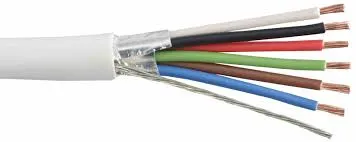
Electrical Cabling Solutions for Efficient and Safe Installation Services
The Importance of Quality Cabling in Electrical Companies
In the modern world, where the demands for high-speed internet and reliable electrical systems are ever-increasing, the role of quality cabling in electrical companies cannot be overstated. Cabling forms the backbone of electrical infrastructure, ensuring that power and data are transmitted efficiently and safely. Investing in appropriate cabling solutions is essential for electrical companies striving to meet both client expectations and regulatory requirements.
The Basics of Cabling Systems
Cabling systems are typically categorized into two main types power cables and data cables. Power cables are used to transport electricity from one point to another, while data cables connect various network devices, enabling communication and data exchange. Each type has unique requirements and specifications based on voltage, ampacity, signal integrity, and environmental conditions. Understanding these distinctions is crucial for electrical companies to ensure proper installations.
Types of Cabling
1. Power Cabling This category includes low-voltage and high-voltage cables. Common types of power cables are single-core and multi-core cables, which can be insulated with materials like PVC, XLPE, or rubber depending on the application. Electrical companies often use armored cables for underground installations to protect against physical damage.
2. Data Cabling Essential for modern telecommunication needs, data cabling can be further divided into twisted pair cables (such as CAT5e, CAT6, and CAT6a) and fiber-optic cables. Twisted pair cables are typically used for local area networks (LAN), whereas fiber optics offer faster data transmission over longer distances, making them crucial for internet service providers.
3. Specialty Cables In addition to standard power and data cables, electrical companies may also need to utilize specialty cables designed for specific applications. This includes cables for automotive use, marine applications, or harsh environments where extreme temperature resistance and chemical durability are required.
Safety and Compliance
cabling electrical company

Safety is paramount when it comes to cabling in electrical installations. Electrical companies must adhere to various regulatory standards and codes, such as the National Electrical Code (NEC) in the United States, which outlines requirements for safe construction and installation practices. Using an appropriate cabling system not only reduces the risk of electrical hazards but also ensures compliance with local building codes, which can protect companies from legal liabilities.
Moreover, the quality of cabling affects the overall efficiency of electrical systems. Poor-quality cables can lead to power losses, overheating, and potential fire hazards. Ensuring that cables are rated for their intended use and installed correctly is an investment in long-term safety and functionality.
The Role of Technology
With the rapid advancements in technology, the evolution of cabling standards presents both challenges and opportunities for electrical companies. The shift to smart technology and the Internet of Things (IoT) requires updated cabling solutions capable of handling increased data loads and connectivity demands. Companies must stay abreast of the latest developments in cabling technology to offer clients the best possible solutions that not only meet current needs but also anticipate future requirements.
Sustainability in Cabling Practices
As sustainability becomes a more pressing concern across industries, electrical companies are also looking at the environmental impact of their cabling practices. This includes utilizing recyclable materials, minimizing waste, and ensuring that installed cables are energy-efficient. Incorporating sustainable practices can serve as a unique selling point and help companies align with corporate social responsibility goals.
Conclusion
In summary, the importance of quality cabling in electrical companies is multifaceted, encompassing safety, compliance, technology integration, and sustainability. As electrical infrastructure continues to evolve, the need for reliable and efficient cabling will only grow. By prioritizing high standards in cabling systems, electrical companies can not only enhance their service offerings but also foster long-lasting relationships with clients based on trust and reliability. Investing in the right cabling solutions today is fundamental to building a secure and efficient electrical future.
-
Reliable LIYCY Cable Solutions for Low and Medium Voltage ApplicationsNewsJul.14,2025
-
Premium Overhead Electrical Wire Solutions for Low and Medium Voltage ApplicationsNewsJul.14,2025
-
Innovative XLPE Electrical Cable Solutions for Modern Low and Medium Voltage NetworksNewsJul.14,2025
-
High-Quality Ethylene Propylene Rubber Cable – Durable EPDM Cable & 1.5 mm 3 Core OptionsNewsJul.14,2025
-
Exploring the Versatility of H1Z2Z2-K 1X4mm2 Cables in Modern ApplicationsNewsJul.14,2025
-
Uses of Construction WiresNewsJul.14,2025
-
Types of Neoprene CableNewsJul.14,2025














